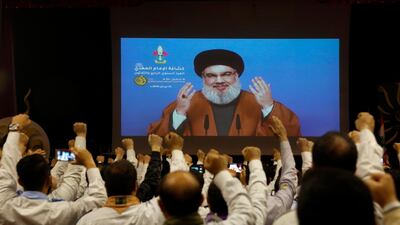Hezbollah leader Hassan Nasrallah denied on Monday reports published by a Kuwaiti newspaper that he had predicted a war with Israel this summer and that he might be assassinated soon.
“I did not say these words… I did not say there would be an Israel war with Lebanon this summer, I never even thought about it,” he said in a speech Monday night, quoted by the state-run Lebanese National News Agency.
In an article published Sunday, Kuwaiti newspaper Al Rai wrote that Mr Nasrallah told regional leaders in a meeting that "there are many signs that Israel is trying to surprise everyone like in 2006," urging them to "not hide the possibility of war" to their supporters. Mr Nasrallah supposedly added that "Iran and Hezbollah are in a defensive position and will not initiate an attack."
During the summer of 2006, over 1,100 Lebanese civilians and 120 Israel soldiers were killed in Israel’s war against Hezbollah, which functions as a regular political party in Lebanon but also controls a private militia of thousands.
Al Rai quoted Mr Nasrallah as warning of the possibility that he might be assassinated by Israel alongside other party leaders, arguing however that “this does not mean the end of Hezbollah, which does not depend on individual people but is part of Lebanese society.”
But speaking on the 34th anniversary of the foundation of Hezbollah’s scouts association, Mr Nasrallah called the article fiction. “I advise this newspaper to ask the author of this article, whom I do not know, to write the scenario of a fictional film,” he said.
Mr Nasrallah also belittled the Israeli military, saying that “Israeli ground forces are not ready for war”.
Al Rai published a follow-up article on Monday writing that "Washington sources" had responded to its initial report by saying that should a war break out, "Israel would not be the first to fire a bullet, but would not hesitate to defend itself if attacked."
The elusive Hezbollah leader, who never appears in public and is rumoured to live in a bunker in South Beirut out of fear of assassination, justified his response to Al Rai, saying that he does not “normally” comment on newspapers articles, but that he was “obliged” to react because of the “negative impression” it created among “the people, political circles and many analysts.”
He then moved on to bash Saudi TV network Al Arabiya, which reported that there were clashes between Iranian and Russian forces in Aleppo and Deir Ezzor in Syria, and that Hezbollah intervened in the fighting.
“This is a total lie,” said Mr Nasrallah, adding that he never turned on Al Arabiya himself but that “others” who had watched the report told him about it.
“There may be political differences in some areas” between Syria’s two allies, said Mr Nasrallah, but that “does not affect co-operation in the field.”
Mr Nasrallah also denied reports that Hezbollah's Lebanese political ally Amal could be facing sanctions soon. The National broke the news this month.
“This has no basis whatsoever. This is the work of politicians and the media,” he said.
In a speech two weeks ago, he acknowledged that “there are Lebanese in Washington working towards putting friends and allies of Hezbollah on a terror list.”
As he does in most of his speeches, Mr Nasrallah also lambasted US policy in the Middle East, accusing the administration of US President Donald Trump of wanting to “starve” the world, including Syria. “They are aiming to achieve what they failed to accomplish militarily by starvation, siege and sanctions.”
The US treasury warned in November against selling oil to Syria, pushing the government to ration fuel, which has brought traffic to a halt in government-controlled areas.
In addition to commenting on regional issues, Mr Nasrallah addressed Lebanese politics, stressing that a “solution” must be found quickly to avoid a financial crisis.
He recognised that austerity measures would have to be implemented but warned that the party had a “red line”: No new taxes on low-income households.
The UN says a third of the Lebanese population lives on less than $270 (Dh992) a month.

